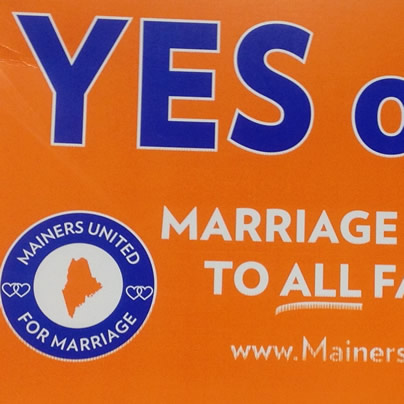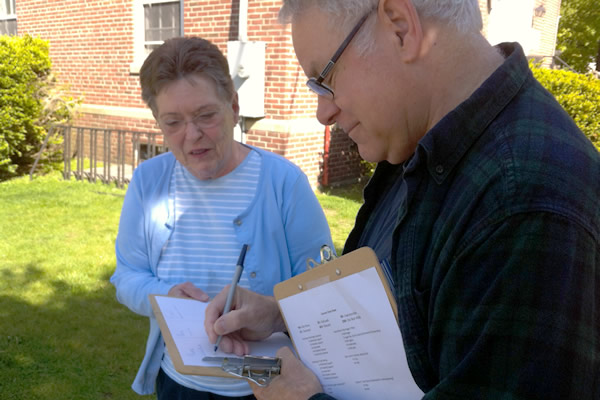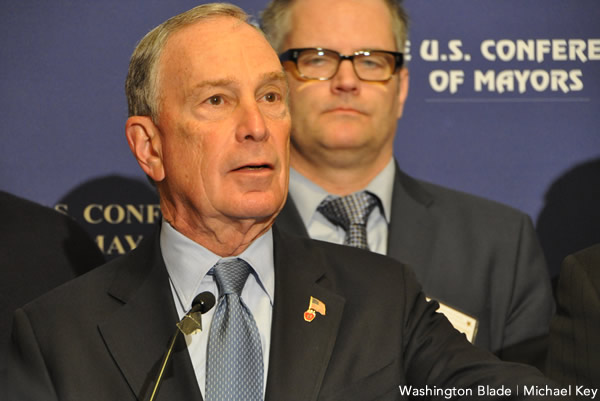National
State marriage campaigns make final election push
Voters in Maine, Md., Minn. and Washington to consider measures next week


A Mainers United for Marriage volunteer speaks with a likely voter (Photo courtesy of Mainers United for Marriage)
With less than a week before Election Day, the four statewide same-sex marriage campaigns remain optimistic voters will support ballot measures that will allow gay men and lesbians to tie the knot.
“We feel as confident as I’ve ever felt going into a campaign,” said Matt McTighe, campaign director of Mainers United for Marriage.
State campaign finance reports indicate Mainers United for Marriage has raised nearly four times as much money as Protect Marriage Maine, but the anti-Question 1 group continues to air television ads across the state that same-sex marriage supporters maintain mislead voters.
Protect Marriage Maine’s latest television ad features David and Tania Parker who unsuccessfully sued their son’s suburban Boston school after he brought home a book that features two men who get married. The Maryland Marriage Alliance, the group that prompted a Nov. 6 referendum on the Free State’s same-sex marriage law Gov. Martin O’Malley signed this year, earlier this month debuted a similar ad that features the Lexington, Mass., couple.
“What we do in a school is no substitute for what happens at home. That’s where family values come in — that’s where core values come in,” said teacher Amy Boungard who appears in a Mainers United for Marriage ad that counters the Protect Marriage Maine spot that features the Parkers. “No law is going to change the core values we teach here at home.”
A number of politicians, celebrities and other high-profile figures have either backed same-sex marriage referenda in Maine, Minnesota and Washington or opposed a proposed state constitutional amendment that would ban nuptials for gays and lesbians in Minnesota.
New York City Mayor Michael Bloomberg earlier this month donated $500,000 to the Maine, Minnesota and Washington same-sex marriage campaigns. The Johns Hopkins University graduate on Oct. 12 gave $250,000 to Marylanders for Marriage Equality, the group defending Question 6.
Actor Brad Pitt on Wednesday announced he will donate $100,000 to the Human Rights Campaign’s National Marriage Fund that supports the four statewide campaigns — HRC will have invested $5 million in these ballot measures by Election Day. Bill and Melinda Gates on Oct. 23 made a $500,000 donation to Washington United for Marriage, the group supporting the referendum on the state’s same-sex marriage law Gov. Chris Gregoire signed in February.
“These amazing gifts, from two visionary leaders, demonstrate their confidence in our campaign, which families across Washington State are counting on us to win,” said Zach Silk, campaign manager for Washington United for Marriage, who also applauded Bloomberg. “They join tens of thousands of individual donors and their call to action, coming as it does in these final days, is an inspiration to every supporter of the freedom to marry.”
Vikings punter Chris Kluwe joined U.S. Sens. Amy Klobuchar and Al Franken and hundreds of others at a Minneapolis rally on Oct. 29 against Minnesota’s proposed ban on marriage for same-sex couples.
Minnesotans United for All Families reported on Oct. 30 it has raised more than $3 million in cash and in-kind contributions since September.
A Star-Tribune Minnesota Poll published on Oct. 28 found 48 percent of likely voters support the proposed amendment, compared to 47 percent who oppose it. Richard Carlbom, campaign manager for Minnesotans United for All Marriage, conceded to the Washington Blade he expects the election results to be close. He stressed, however, he remains confident state voters will reject the proposed amendment.
“It’s an incredible force right now and we’re really proud of Minnesota standing up and uniting behind this idea that we can fight back this amendment,” he said, referring to the group’s latest campaign finance report that indicates 63,000 people have contributed to Minnesotans United for All Families. Carlbom said the campaign also has 10,000 volunteers who will work with potential voters in the days leading up to Election Day. “We know every vote will count.”
McTighe was quick to point out he does not want to become overconfident going into Election Day. He remains cautiously optimistic, however, about his group’s prospects in Maine and other same-sex marriage campaigns across the country.
“We’ve never won one of these ballot measures,” said McTighe. “I feel as good as I can possibly feel.”
Federal Government
Lambda Legal praises Biden-Harris administration’s finalized Title IX regulations
New rules to take effect Aug. 1

The Biden-Harris administration’s revised Title IX policy “protects LGBTQ+ students from discrimination and other abuse,” Lambda Legal said in a statement praising the U.S. Department of Education’s issuance of the final rule on Friday.
Slated to take effect on Aug. 1, the new regulations constitute an expansion of the 1972 Title IX civil rights law, which prohibits sex-based discrimination in education programs that receive federal funding.
Pursuant to the U.S. Supreme Court’s ruling in the landmark 2020 Bostock v. Clayton County case, the department’s revised policy clarifies that discrimination on the basis of sexual orientation and gender identity constitutes sex-based discrimination as defined under the law.
“These regulations make it crystal clear that everyone can access schools that are safe, welcoming and that respect their rights,” Education Secretary Miguel Cardona said during a call with reporters on Thursday.
While the new rule does not provide guidance on whether schools must allow transgender students to play on sports teams corresponding with their gender identity to comply with Title IX, the question is addressed in a separate rule proposed by the agency in April.
The administration’s new policy also reverses some Trump-era Title IX rules governing how schools must respond to reports of sexual harassment and sexual assault, which were widely seen as imbalanced in favor of the accused.
Jennifer Klein, the director of the White House Gender Policy Council, said during Thursday’s call that the department sought to strike a balance with respect to these issues, “reaffirming our longstanding commitment to fundamental fairness.”
“We applaud the Biden administration’s action to rescind the legally unsound, cruel, and dangerous sexual harassment and assault rule of the previous administration,” Lambda Legal Nonbinary and Transgender Rights Project Director Sasha Buchert said in the group’s statement on Friday.
“Today’s rule instead appropriately underscores that Title IX’s civil rights protections clearly cover LGBTQ+ students, as well as survivors and pregnant and parenting students across race and gender identity,” she said. “Schools must be places where students can learn and thrive free of harassment, discrimination, and other abuse.”
Michigan
Mich. Democrats spar over LGBTQ-inclusive hate crimes law
Lawmakers disagree on just what kind of statute to pass

Michigan could soon become the latest state to pass an LGBTQ-inclusive hate crime law, but the state’s Democratic lawmakers disagree on just what kind of law they should pass.
Currently, Michigan’s Ethnic Intimidation Act only offers limited protections to victims of crime motivated by their “race, color, religion, gender, or national origin.” Bills proposed by Democratic lawmakers expand the list to include “actual or perceived race, color, religion, gender, sexual orientation, gender identity or expression, ethnicity, physical or mental disability, age, national origin, or association or affiliation with any such individuals.”
Democratic Gov. Gretchen Whitmer and Attorney General Dana Nessel have both advocated for a hate crime law, but house and senate Democrats have each passed different hate crimes packages, and Nessel has blasted both as being too weak.
Under the house proposal that passed last year (House Bill 4474), a first offense would be punishable with a $2,000 fine, up to two years in prison, or both. Penalties double for a second offense, and if a gun or other dangerous weapons is involved, the maximum penalty is six years in prison and a fine of $7,500.
But that proposal stalled when it reached the senate, after far-right news outlets and Fox News reported misinformation that the bill only protected LGBTQ people and would make misgendering a trans person a crime. State Rep. Noah Arbit, the bill’s sponsor, was also made the subject of a recall effort, which ultimately failed.
Arbit submitted a new version of the bill (House Bill 5288) that added sections clarifying that misgendering a person, “intentionally or unintentionally” is not a hate crime, although the latest version (House Bill 5400) of the bill omits this language.
That bill has since stalled in a house committee, in part because the Democrats lost their house majority last November, when two Democratic representatives resigned after being elected mayors. The Democrats regained their house majority last night by winning two special elections.
Meanwhile, the senate passed a different package of hate crime bills sponsored by state Sen. Sylvia Santana (Senate Bill 600) in March that includes much lighter sentences, as well as a clause ensuring that misgendering a person is not a hate crime.
Under the senate bill, if the first offense is only a threat, it would be a misdemeanor punishable by one year in prison and up to $1,000 fine. A subsequent offense or first violent hate crime, including stalking, would be a felony that attracts double the punishment.
Multiple calls and emails from the Washington Blade to both Arbit and Santana requesting comment on the bills for this story went unanswered.
The attorney general’s office sent a statement to the Blade supporting stronger hate crime legislation.
“As a career prosecutor, [Nessel] has seen firsthand how the state’s weak Ethnic Intimidation Act (not updated since the late 1980’s) does not allow for meaningful law enforcement and court intervention before threats become violent and deadly, nor does it consider significant bases for bias. It is our hope that the legislature will pass robust, much-needed updates to this statute,” the statement says.
But Nessel, who has herself been the victim of racially motivated threats, has also blasted all of the bills presented by Democrats as not going far enough.
“Two years is nothing … Why not just give them a parking ticket?” Nessel told Bridge Michigan.
Nessel blames a bizarre alliance far-right and far-left forces that have doomed tougher laws.
“You have this confluence of forces on the far right … this insistence that the First Amendment protects this language, or that the Second Amendment protects the ability to possess firearms under almost any and all circumstances,” Nessel said. “But then you also have the far left that argues basically no one should go to jail or prison for any offense ever.”
The legislature did manage to pass an “institutional desecration” law last year that penalizes hate-motivated vandalism to churches, schools, museums, and community centers, and is LGBTQ-inclusive.
According to data from the U.S. Department of Justice, reported hate crime incidents have been skyrocketing, with attacks motivated by sexual orientation surging by 70 percent from 2020 to 2022, the last year for which data is available.
Twenty-two states, D.C., Puerto Rico, and the U.S. Virgin Islands have passed LGBTQ-inclusive hate crime laws. Another 11 states have hate crime laws that include protections for “sexual orientation” but not “gender identity.”
Michigan Democrats have advanced several key LGBTQ rights priorities since they took unified control of the legislature in 2023. A long-stalled comprehensive anti-discrimination law was passed last year, as did a conversion therapy ban. Last month the legislature updated family law to make surrogacy easier for all couples, including same-sex couples.
A bill to ban the “gay panic” defense has passed the state house and was due for a Senate committee hearing on Wednesday.
Indiana
Drag queen announces run for mayor of Ind. city
Branden Blaettne seeking Fort Wayne’s top office

In a Facebook post Tuesday, a local drag personality announced he was running for the office of mayor once held by the late Fort Wayne Mayor Tom Henry, who died last month just a few months into his fifth term.
Henry was recently diagnosed with late-stage stomach cancer and experienced an emergency that landed him in hospice care. He died shortly after.
WPTA, a local television station, reported that Fort Wayne resident Branden Blaettne, whose drag name is Della Licious, confirmed he filed paperwork to be one of the candidates seeking to finish out the fifth term of the late mayor.
Blaettner, who is a community organizer, told WPTA he doesn’t want to “get Fort Wayne back on track,” but rather keep the momentum started by Henry going while giving a platform to the disenfranchised groups in the community. Blaettner said he doesn’t think his local fame as a drag queen will hold him back.
“It’s easy to have a platform when you wear platform heels,” Blaettner told WPTA. “The status quo has left a lot of people out in the cold — both figuratively and literally,” Blaettner added.

The Indiana Capital Chronicle reported that state Rep. Phil GiaQuinta, who has led the Indiana House Democratic caucus since 2018, has added his name to a growing list of Fort Wayne politicos who want to be the city’s next mayor. A caucus of precinct committee persons will choose the new mayor.
According to the Fort Wayne Journal Gazette, the deadline for residents to file candidacy was 10:30 a.m. on Wednesday. A town hall with the candidates is scheduled for 6 p.m. on Thursday at Franklin School Park. The caucus is set for 10:30 a.m. on April 20 at the Lincoln Financial Event Center at Parkview Field.
At least six candidates so far have announced they will run in the caucus. They include Branden Blaettne, GiaQuinta, City Councilwoman Michelle Chambers, City Councilwoman Sharon Tucker, former city- and county-council candidate Palermo Galindo, and 2023 Democratic primary mayoral candidate Jorge Fernandez.
-

 Africa5 days ago
Africa5 days agoCongolese lawmaker introduces anti-homosexuality bill
-

 District of Columbia2 days ago
District of Columbia2 days agoReenactment of first gay rights picket at White House draws interest of tourists
-

 District of Columbia1 day ago
District of Columbia1 day agoNew D.C. LGBTQ+ bar Crush set to open April 19
-

 World5 days ago
World5 days agoOut in the World: LGBTQ news from Europe and Asia












